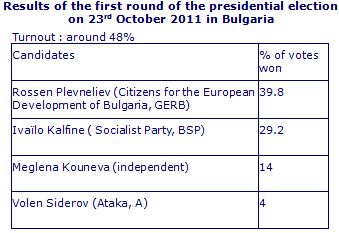News
Corinne Deloy,
Fondation Robert Schuman,
Helen Levy
-

Available versions :
EN

Corinne Deloy
Fondation Robert Schuman
Helen Levy
The ruling party's candidate, Rossen Plevneliev, easily won the first round of the presidential election that took place on 23rd October in Bulgaria. The former Regional Development and Public Works Minister in the government led by Boyko Borissov (Citizens for the European Development of Bulgaria – GERB) won 39.8% of the vote. He drew ahead of the Socialist candidate (BSP), Ivaylo Kalfin, MEP and former Foreign Minister (2005-2009) in the government led by Serguey Stanichev (BSP) who won 29.2% of the vote. Independent candidate, former European Affairs Minister (2002-2006) and European Commissioner for Consumer Protection (2007-2009), Meglena Kuneva, came third with 14% of the vote.
Volen Siderov, leader of the far-right party, Ataka, which provides parliamentary support to Boyko Borissov's government, did not succeed in repeating his success of the last presidential election on 22nd and 29th October 206. Whilst back then he managed to enter the second round after winning 21.48% of the vote in the first round, he had to settle for 4% of the vote this year. Therefore he did not take advantage of the inter-ethnic tension that upset Bulgaria in the last few weeks of the electoral campaign (riots broke out between "Bulgarians" and Roma after the death on 23rd September of a Angel Petrov, who was run over as he walked his dog by a car driven by a close friend of the Kiril Rachkov family – the so-called King Kiro – a local patriarch of the Roma community in the town of Katunitsa).
In spite of the fact that local elections were taking place on the same day as the presidential election, turnout remained low. Less than half of the Bulgarians turned out to vote (around 48%).
"It is the first time in the post-communist history of Bulgaria that the government party has won such great support mid-mandate," said the GERB's candidate, Rossen Plevneliev. Prime Minister Boyko Borissov qualified the concentration of power in the hands of his party if its candidate won in the presidential election on 30th October next, as an "enormous responsibility". "The fact that our candidates have achieved such good results (presidential and local elections together) in the midst of a serious financial crisis is the sign of the confidence the Bulgarians have in our political action. It shows that we are on the right path and that we are going towards financial stability whilst other countries are heading towards bankruptcy," stressed the head of government.
"The result achieved by Rossen Plevneliev is a personal victory for Prime Minister Boyko Borissov," declared sociologist Antony Galabov. "In view of the high number of candidates (eighteen in all), the fact that he won more than 30% in the first round strengthens the GERB's legitimacy for the end of its term in office," he added. "These election results consolidate Boyko Borissov's power," indicated Andrey Raichev, director of the Bulgarian branch of Gallup International.
The Socialist Party candidate did not succeed in using the economic crisis to attract a majority of the electorate to the opposition. Ivaylo Kalfin may however be able to count on the support of the Movement for Rights and Freedom (DPS) in the second round – this party is led by Ahmed Dogan, the representative of the Turkish minority of Bulgaria (around 9% of the population).
Independent candidate Meglena Kuneva for her part has not (yet) given any voting instructions.
"I can see three surprises in the first round of this presidential election. The first is the result achieved by Meglena Kuneva, who almost tripled the number of voters of the National Movement for Stability and Progress (MNSE) in the last general elections on 5th July 2009. Ivaylo Kalfin is the second surprise. He won around 250, 000 votes more than the Socialist Party in the last general elections. The third surprise is that Rossen Plevneliev failed to motivate all of the electorate who supported the GERB two years ago," analyses Antony Todorov, Political Science Professor at the New Bulgarian University in Sofia.
In the local elections that also took place on 23rd October, the GERB maintained its position. Hence the outgoing mayor of Sofia, Yordanka Fandakova, was re-elected in the first round. The ruling party's candidates were also re-elected on 23rd October in the towns of Bourgas (in the east of Bulgaria) where Dimitar Nikolov easily beat his rivals, Gabrovo (centre of the country) where Tanya Hristova won and Dobritch (north-east) where Detelina Nikolova won. The Socialist Party won the town of Shumen (north-east) with the victory of Krasimir Krastev and the Movement for Rights and Freedom won in its stronghold of Kardzhali.
Just two years from the next general elections (planned for the summer of 2013), Prime Minister Boyko Borissov can be pleased with the result his candidate has achieved in the first round of the presidential election. "Victory for Rossen Plevneliev would put the GERB in a strong position before the general elections" stresses James Goundry, an analyst with IHS Europe.
A discrete businessman, Rossen Plevneliev largely benefited from the popularity of the head of government. Except if something unexpected happens he should become the new president of the Republic of Bulgaria on 30th October next.
 Source : The Sofia Echo
Source : The Sofia EchoOn the same theme
To go further
Elections in Europe
Corinne Deloy
—
20 January 2026
Elections in Europe
Corinne Deloy
—
13 January 2026
Elections in Europe
Corinne Deloy
—
4 November 2025
Elections in Europe
Corinne Deloy
—
28 October 2025

The Letter
Schuman
European news of the week
Unique in its genre, with its 200,000 subscribers and its editions in 6 languages (French, English, German, Spanish, Polish and Ukrainian), it has brought to you, for 15 years, a summary of European news, more needed now than ever
Versions :



